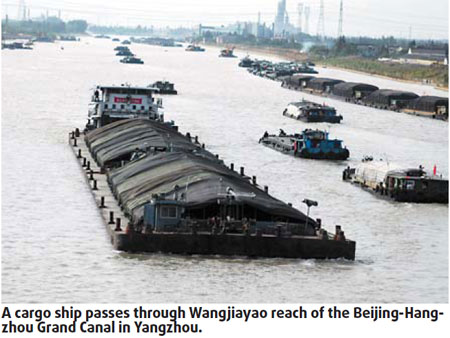


Yangzhou once was the most prosperous city in the Sui, Tang and early Qing dynasties due to its transportation importance for the Beijing-Hangzhou Grand Canal. The 2,500-year-old city is now striving to regain its historical glory, which declined due to the rise of land transportation.
The city government held the promotion fairs on project and technology cooperation in Xi'an, Beijing and Shanghai in late October and mid-November, where it reached 78 agreements with local universities, colleges, research institutions and international companies.
"Yangzhou in recent years is confronted with three urgent challenges including technology, talents and funds, especially during the global financial crisis," says Wen Daocai, deputy mayor of Yangzhou. "The reason why Yangzhou has chosen Xi'an, Beijing and Shanghai lies in the great number of universities, colleges, research institutions and international companies in the three cities."
Wen says 90 percent of the 78 agreements reached were with local universities, colleges and research institutions. For example, Yangzhou reached seven with Xi'an Jiaotong University and eight with Tsinghua University. The Chinese Academy of Sciences is also an important partner with Yangzhou.
All the agreements focus on Yangzhou's pillar industries, petrochemical, automobile manufacturing, shipbuilding and machinery as well as the rising industries such as solar energy and LED (light emitting diode) lighting.
Yangzhou is looking for new lighting sources to cope with energy shortages.
Research institutions on LED lighting at the Chinese Academy of Sciences and Nanjing University have honed in on Yangzhou. The first State-level laboratory of photoelectric products was established in the city this February. Yangzhou was also approved as the production base of LED lighting products at the end of 2007.
"Technology innovation is extremely important for upgrade of the pillar industries and scale enlargement of the rising industries of Yangzhou," says Deputy Mayor Wen. "We hope the three promotion fairs will spur further development of these industries."
The petrochemical industry in Yangzhou realized a gross output value exceeding 55 billion yuan in 2007. With an 81-km coastline, Yangzhou has a shipbuilding capacity of more than 5 million tons. The over 200 automobile manufacturers and part suppliers are expected to sell 300,000 vehicles in 2010.
In 2007, the gross industrial output value of Yangzhou hit 360 billion yuan, while the major industries mentioned above have contributed 60 percent or so.
As one of the famous historical and cultural cities in China receiving the "Habitat Scroll of Honor Award" from the United Nations, Yangzhou is using clean energies to protect the environment for historical and cultural sites and local residents.
There are now more than 30 solar photovoltaic enterprises in Yangzhou including the two leading ones in China JA Solar Holdings Co Ltd and Suntech Power. According to Yangzhou's plans, production of high-purity silicon is predicted to reach 6,000 tons and solar battery 1,500 megawatt in 2012.
Before the fairs, Yangzhou had a long history of cooperation with more than 100 universities and research institutions home and abroad such as Nanjing University and the Chinese Academy of Sciences.
Currently, more than 300 cooperation projects are underway. Yangzhou also plans to increase the investment in research and development (R&D) to 2 percent of the gross domestic product (GDP) of the city. The result is obvious.
In the last three years, Yangzhou's patent application rate has witnessed a growth of 42 percent year-on-year, while patent grants have increased by 32 percent annually.
The output value of hi-tech industries has increased by 45 percent to 57 billion yuan - 10 percent higher than other industries. In 2012, the hi-tech industry is predicted to contribute 35 percent of Yangzhou's gross industrial output value. Export of hi-tech products during the first nine months of this year reached $790 million, a 79.1 percent increase compared with the same period last year, according to statistics from the local customs.
Investors are noticing Yangzhou's growth. The city ranks 21st on the list of the "best commercial cities on the mainland" by Forbes in 2008, 10 spots higher than the previous year. And Yangzhou is the eighth city to be recommended by the Taiwan Electrical and Electronic Manufacturers' Association in a survey on investment environments among mainland cities.
"We hope technologies and talents will inject new vitalities into the ancient city of Yangzhou," Wen says.
(China Daily 12/08/2008 page10)













